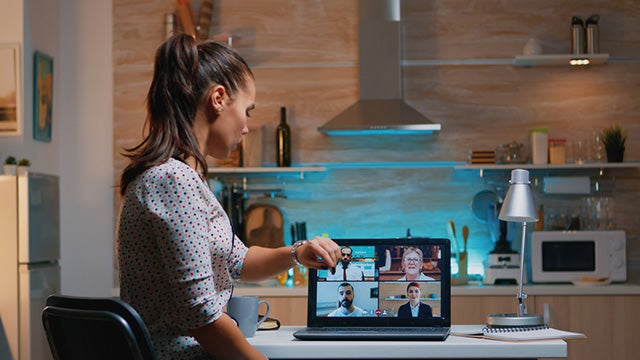More companies are now offering remote work for their employees. Which is appealing for many because of the flexible schedules.
However, you’re probably not aware that working in a remote environment can negatively affect one’s day-to-day routine. It can disrupt your sleep and harm your health. But we can help you avoid that.
Read up on how working from home affects your sleep and what you can do to improve it.
How Working Remotely Affects Your Sleep
Many employees tend to be more productive when they work from home. But contrary to popular belief, remote workers do not always have the freedom on what time they can wake up and sleep.
Some may think this setup allows one to fulfill other responsibilities and hobbies compared to a 9 to 5 shift. However, it takes time management and boundaries to make this possible.
Remote workers have trouble sleeping mainly because they can’t set boundaries between their work and life. They also cannot enforce limits on their working hours. Go for a jog around your neighborhood while on your break time. But this means you need to make up for those hours later on. Soon, you’ll find yourself stressed and sleep-deprived.
Most remote workers are paid per task instead of per hour, so they can work shorter hours if they finish their jobs early. But it can still affect your internal clock if you have colleagues from different time zones.
You will be required to communicate with them even during bedtime, which makes you lose your work-life boundaries. You also have to work very early in the evening to catch up with deadlines.
Is Working Remotely Bad for Your Health?
Remote working can negatively affect your health. Aside from sleep deprivation, here are some health risks of working from home.
Body Ache
You can develop musculoskeletal pain from sitting too long on your chair, especially if it doesn’t feel comfortable. To avoid this, your monitor should be an arm away from you. Get up every few minutes then sit on the couch with your hips and knees at a right angle.
Eye Strain
A blurry vision and headache are commonly experienced after sitting in front of the computer for hours. When we get overly focused in front of the screen, our eye muscles contract. Blue light is another contributor to eye strain because it focuses on our retinas.
Look away every 20 minutes to let your eyes relax. It’s also recommended to adjust your screen’s angle to 20 degrees below eye level. You may also invest in blue light glasses for comfort.
Mental Health
The absence of scheduled working hours can take away your time for leisure and socializing, which can be a huge risk for several mental health issues. Those who suffer from depression and anxiety may experience worse symptoms.
A remote environment can lead to unhealthy habits like excessive caffeine intake, a sedentary lifestyle, and isolating oneself from other people.
Tips for Improving Your Sleep While Working Remotely
Working remotely can affect your sleeping patterns and habits, so ensure a good night’s sleep with the following tips.
1. Maintain a Schedule
Sticking to a schedule is the best way to guarantee you get enough sleep. Working and sleeping at different times will give your body clock a hard time adjusting to your cycle. A consistent schedule should include your working hours, meals, breaks, and bedtime. Try setting your alarm even if you don’t have to work so your sleep-wake cycle stays constant.
2. Keep Your Workspace Outside the Bedroom
Ideally, your workspace should be outside your bedroom. The bedroom is a safe space from stress, troubles, and responsibilities, so set up your computer and papers in a spare room.
But if this is impossible for you, try to create a designated space for work that you only use during working hours. And make sure it’s away from your bed. Avoid doing your work on top of your bed. Doing this makes you unconsciously associate the bed with productivity instead of rest.
3. Restrict Caffeine Intake at Night
It’s easy to drink four cups of coffee a day when the kitchen is just a few steps away. Also, there’s no need to pay when getting a latte! But caffeine is a stimulating substance that reduces your time of sleep and level of satisfaction.
Drinking coffee at night will result in sleep deprivation, causing headaches, fatigue, and problems with problem-solving, emotions, and memory.
4. Take Regular Breaks
Take the opportunity to nap, stretch, and change your scenery when working in a remote environment. This helps avoid total burnout. But keep these regular breaks short. Ideally, nap times should only be 20 minutes long, or 90-120 minutes for sleep-deprived people. Longer naps can result in grogginess when it’s time to work. It can also lead to sleeplessness later on.
5. No More Screen Time During Bedtime
Unplug all your devices once you enter your bedroom. Don’t spend hours on social media before sleeping and stop doing last-minute tasks. Try leaving your laptop in your office room and your phone on your bedside table. Ignore any calls and messages and turn off the television.
6. Get Natural Light During the Day
Open your curtains to let the natural light in when you wake up. You can also go out for a walk or eat your breakfast outdoors. This will keep your circadian rhythm because the body is being signaled that it’s morning.
7. Exercise
You miss out on a lot of steps taken and calories burnt when you work remotely. That’s because you don’t walk to the bus stop anymore and walk to your office. Try walking outside or doing a quick cardio workout before preparing for work. This will keep you active in the morning and restful at night.
You may want to read: Working and Sleeping Throughout the Pandemic
Final Thoughts on Remote Working and Sleep
Remote work seems like the best option for you to enjoy your hobbies and spend more time with your family while working. However, they also have negative side effects on your sleep and overall health.
If this article has served you well, make sure to share it with your friends who need a reminder to take rests while working remotely. Comment your feedback and questions below so we can help you more.
Make sure to maintain a consistent schedule to get enough shut-eye while you’re working remotely.
Photo credit: MT-R/Shutterstock; Zhanna Fashayan/Shutterstock;
insta_photos/Shutterstock; PRPicturesProduction/Shutterstock;
aomas/Shutterstock; fizkes/Shutterstock; Eakachai Leesin/Shutterstock;
Vera Petrunina/Shutterstock; Evgeny Atamanenko/Shutterstock;
DC Studio/Shutterstock; G-Stock Studio/Shutterstock;
OWL_VISION_STUDIO/Shutterstock; Tuzemka/Shutterstock












